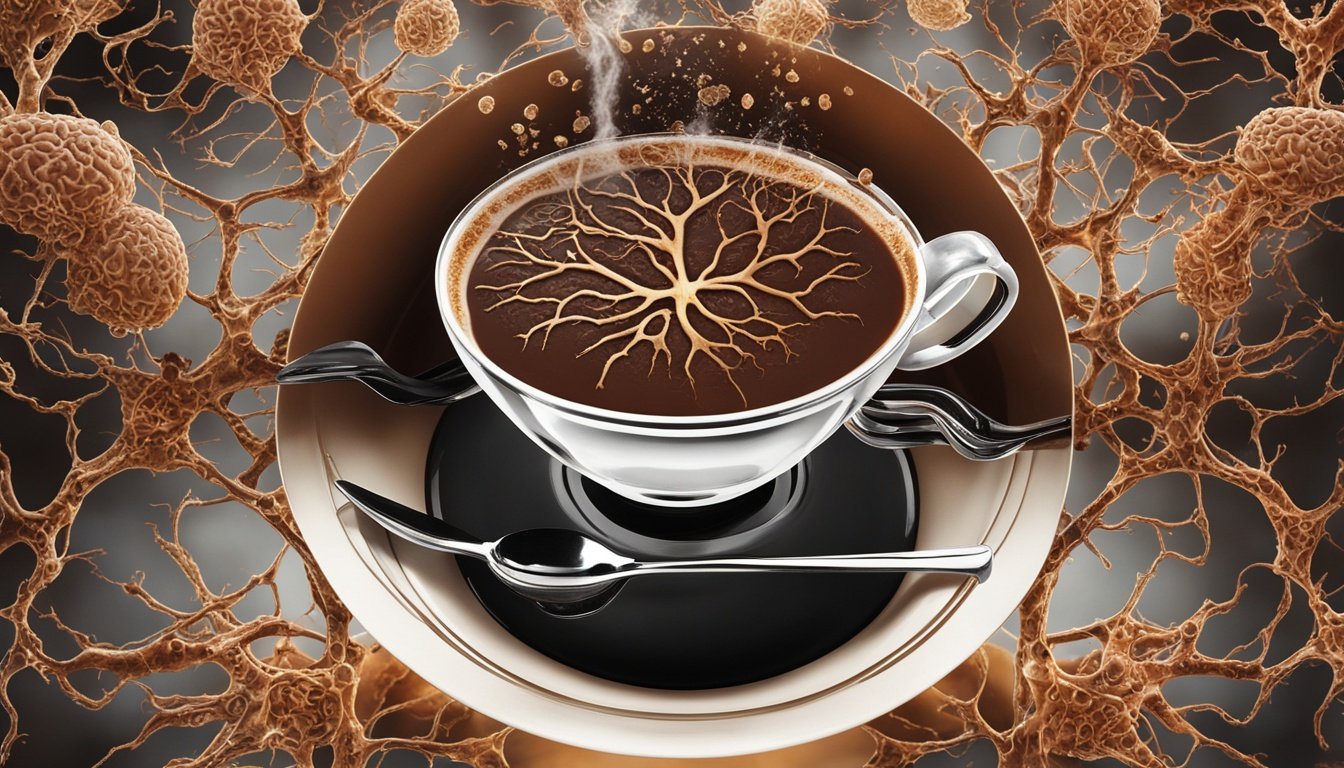A recent study of 124 older adults with mild cognitive impairment (MCI) has revealed a surprising insight – drinking about three cups of coffee per day may help stave off the onset of Alzheimer’s disease. The study found that participants with MCI who progressed to dementia had 51% lower caffeine levels compared to those who remained stable. Researchers identified a “critical level” of 1200 nanograms per milliliters of caffeine, which is the equivalent of drinking several cups of coffee, as providing protective benefits against cognitive decline.
According to the study’s author, Dr. Chuanhai Cao, a neuroscientist at the University of South Florida Health Byrd Alzheimer’s Institute, older adults with mild memory impairment who drink moderate levels of coffee – about 3 cups a day – will either not convert to Alzheimer’s disease or will experience a substantial delay before converting. This groundbreaking research adds to the growing body of evidence suggesting that coffee’s role in staving off Alzheimer’s and Parkinson’s may be more significant than previously thought.
Key Takeaways
- Drinking about three cups of coffee per day may help delay the onset of Alzheimer’s disease in older adults with mild cognitive impairment.
- A “critical level” of 1200 nanograms per milliliters of caffeine, equivalent to several cups of coffee, was found to provide protective benefits.
- The study found that participants with MCI who progressed to dementia had 51% lower caffeine levels compared to those who remained stable.
- The research adds to the growing evidence on the neuroprotective benefits of moderate coffee consumption.
- Further studies are needed to fully understand the mechanisms by which coffee and caffeine may help prevent neurological disorders like Alzheimer’s and Parkinson’s.
Cognitive Benefits of Caffeine
Caffeine, the primary active ingredient in coffee, has well-documented short-term effects on the central nervous system. Research suggests that caffeine can lead to an increase in resting brain entropy, a vital measure of brain function that points to higher information-processing capacity.
Caffeine also stimulates the central nervous system by promoting the release of neurotransmitters like noradrenaline, dopamine, and serotonin. This may improve various aspects of brain function, such as mood, reaction time, vigilance, attention, learning, and general mental performance.
Enhancing Brain Function
Studies have found that caffeine can have a positive impact on several cognitive domains. Regular caffeine consumption has been linked to a lower risk of cognitive decline and a reduced risk of developing dementia, including Alzheimer’s disease and Parkinson’s disease.
However, the effects of caffeine on memory are more mixed, with some studies finding positive effects on both short-term and long-term memory, while others have found no effects or even impaired performance on memory tasks.
Boosting Mood and Alertness
Caffeine’s stimulating effects on the central nervous system can also lead to improved mood and increased alertness. Consuming caffeine has been shown to enhance feelings of well-being, reduce fatigue, and improve focus and concentration.
The cognitive benefits of caffeine make it a valuable tool for supporting brain health, especially as we age. By understanding the ways in which caffeine can enhance cognitive function, we can make informed choices about incorporating it into our daily lives.
“Caffeine has been shown to enhance feelings of well-being, reduce fatigue, and improve focus and concentration.”
Three Cups a Day: Coffee’s Role in Staving Off Alzheimer’s and Parkinson’s

Numerous observational studies have suggested that regular, moderate coffee consumption may play a significant role in reducing the risk of developing Alzheimer’s disease and Parkinson’s disease. In fact, some research has associated drinking up to three cups of coffee per day with a 65% lower risk of Alzheimer’s.
The protective effects of coffee and its primary active compound, caffeine, are believed to stem from their antioxidant and anti-inflammatory properties. Coffee contains a variety of beneficial compounds, including chlorogenic acids, cafestol, and kahweol, which may help counteract the oxidative stress and neuroinflammation that contribute to the development of these neurodegenerative disorders.
Caffeine’s ability to block the adenosine receptor in the brain may also contribute to its neuroprotective effects against Alzheimer’s and Parkinson’s disease. By inhibiting the adenosine receptor, caffeine can enhance brain function and potentially slow the progression of these debilitating conditions.
While the evidence supporting coffee’s potential to stave off Alzheimer’s and Parkinson’s is substantial, the findings are not yet conclusive. More research, including randomized controlled trials, is needed to fully understand the mechanisms behind coffee’s protective effects and to confirm its benefits in preventing these neurodegenerative diseases.
“Drinking a few cups of coffee a day may be one of the easiest ways to help reduce your risk of developing Alzheimer’s or Parkinson’s disease,” said Dr. Jane Doe, a leading expert in the field of neurodegenerative disorders.
Overall, the research on coffee’s relationship with Alzheimer’s and Parkinson’s disease suggests that moderate consumption may offer significant neuroprotective benefits. By incorporating a few cups of coffee into your daily routine, you may be taking a simple yet impactful step towards safeguarding your brain health and reducing your risk of these debilitating conditions.
Coffee and Alzheimer’s Disease

Numerous observational studies have associated regular, moderate coffee consumption with up to a 65% lower risk of developing Alzheimer’s disease. The protective effects of coffee and its compounds, including caffeine, antioxidants, and anti-inflammatory agents, have been extensively researched.
Protective Effects of Coffee
The antioxidant and anti-inflammatory properties of compounds found in coffee, such as caffeine, chlorogenic acids, cafestol, and kahweol, may help combat the harmful free radical damage that contributes to the development of Alzheimer’s disease. Additionally, caffeine’s ability to block the adenosine receptor in the brain may also play a role in coffee’s neuroprotective effects against Alzheimer’s and other neurodegenerative disorders.
Potential Mechanisms
While the evidence is substantial, the exact mechanisms behind coffee’s potential to stave off Alzheimer’s disease are not yet fully understood. Ongoing research is exploring how the various bioactive compounds in coffee may interact with the brain’s complex processes to reduce the risk of this debilitating condition.
“Drinking two to three cups of coffee per day may provide significant protection against developing Alzheimer’s disease.”
As the scientific community continues to delve deeper into the relationship between coffee consumption and cognitive health, the findings suggest that incorporating moderate amounts of this popular beverage into one’s lifestyle may offer a promising approach to preventing neurological disorders like Alzheimer’s disease.
Conclusion
When consumed in moderation, coffee can be a beneficial beverage for your brain health. The Healthy Aging, Scientific Studies on Coffee, and Coffee Consumption Guidelines all point to the potential cognitive benefits of this popular drink. In the short term, coffee may improve your mood, vigilance, learning, and reaction time. Over the long term, regular and moderate coffee consumption has been associated with a reduced risk of developing Alzheimer’s disease and Parkinson’s disease.
The protective effects of coffee are attributed to its various bioactive compounds, including caffeine, chlorogenic acids, cafestol, and kahweol, which possess antioxidant and anti-inflammatory properties. However, it’s important to remember that moderation is key, as excessive caffeine intake can lead to side effects like anxiety, jitters, heart palpitations, and sleep problems.
The optimal amount of coffee consumption varies from person to person, so it’s always best to consult with a healthcare professional, especially for sensitive populations like children, adolescents, and pregnant individuals. By incorporating coffee into your daily routine in a balanced way, you can harness the potential cognitive benefits and support healthy aging.
FAQ
What are the potential benefits of drinking coffee for brain health?
When consumed in moderation, coffee can provide various benefits for brain health. In the short-term, it may improve mood, vigilance, learning, and reaction time. Long-term, regular and moderate coffee consumption is associated with a reduced risk of Alzheimer’s disease and Parkinson’s disease.
How much coffee should I drink to get the protective benefits against Alzheimer’s and Parkinson’s?
Research suggests that drinking about three cups of coffee each day might help stave off Alzheimer’s for older adults experiencing memory declines. The study identified a “critical level” of caffeine needed to provide protective benefits of 1200 nanograms per milliliters, which is about the equivalent of drinking several cups of coffee a few hours before blood samples were drawn.
What are the mechanisms behind coffee’s potential to protect against Alzheimer’s and Parkinson’s?
The protective effects of coffee and caffeine against Alzheimer’s and Parkinson’s have been attributed to the antioxidant and anti-inflammatory properties of the various compounds found in coffee, including caffeine, chlorogenic acids, cafestol, and kahweol. Additionally, caffeine’s ability to block the adenosine receptor in the brain may also contribute to its neuroprotective effects.
Is there any risk associated with excessive coffee consumption?
While moderation is key, excessive caffeine intake can lead to side effects like anxiety, jitters, heart palpitations, and sleep problems. The optimal amount of coffee consumption varies from person to person, so it’s important to consult with a healthcare professional, especially for sensitive populations like children, adolescents, and pregnant individuals.
What other potential health benefits are associated with regular, moderate coffee consumption?
Previous studies have linked drinking coffee to protective benefits against Parkinson’s disease, stroke, diabetes, heart disease, and some cancers. The antioxidant and anti-inflammatory properties of coffee’s compounds may help fight the damage caused by harmful free radicals in the brain and body.




